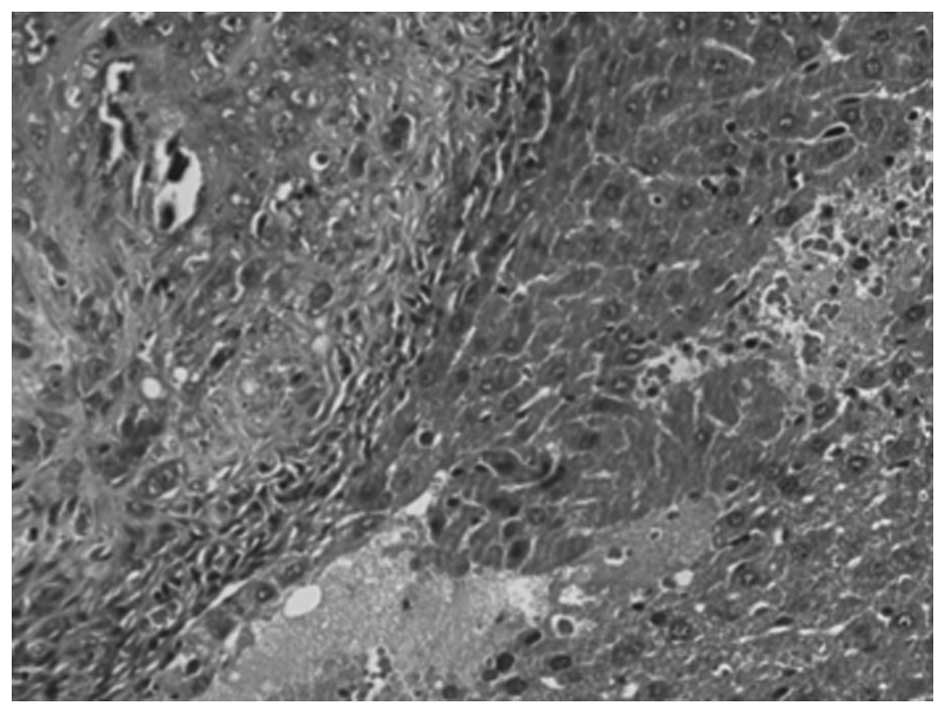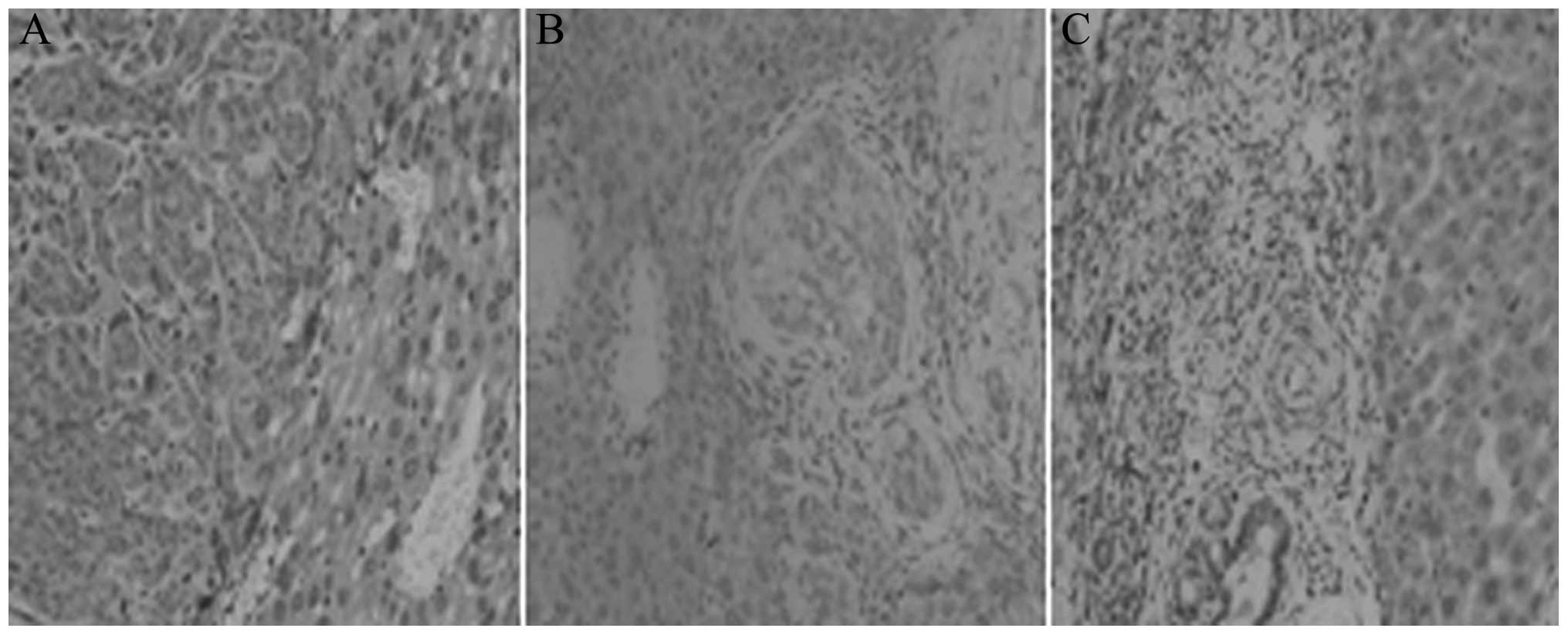|
1.
|
Tang ZY, Ye SL, Liu YK, et al: A decade’s
studies on metastasis of hepatocellular carcinoma. J Cancer Res
Clin Oncol. 130:187–196. 2004.
|
|
2.
|
Qin LX and Tang ZY: Recent progress in
predictive biomarkers for metastatic recurrence of human
hepatocellular carcinoma: a review of the literature. J Cancer Res
Clin Oncol. 130:497–513. 2004.PubMed/NCBI
|
|
3.
|
D’Amato RJ, Loughnan MS, Flynn E and
Folkman J: Thalidomide is an inhibitor of angiogenesis. Proc Natl
Acad Sci USA. 91:4082–4085. 1994.
|
|
4.
|
Shortt J, Hsu AK and Johnstone RW:
Thalidomide-analogue biology: immunological, molecular and
epigenetic targets in cancer therapy. Oncogene. Jan 14–2013.[Epub
ahead of print].
|
|
5.
|
Chen YY, Yen HH, Chou KC and Wu SS:
Thalidomide-based multidisciplinary treatment for patients with
advanced hepatocellular carcinoma: a retrospective analysis. World
J Gastroenterol. 18:466–471. 2012. View Article : Google Scholar : PubMed/NCBI
|
|
6.
|
Ang SF, Tan SH, Toh HC, Poon DY, Ong SY,
Foo KF and Choo SP: Activity of thalidomide and capecitabine in
patients with advanced hepatocellular carcinoma. Am J Clin Oncol.
35:222–227. 2012. View Article : Google Scholar : PubMed/NCBI
|
|
7.
|
Garrison LJ Jr, Wang ST, Huang H, et al:
The cost-effectiveness of initial treatment of multiple myeloma in
the u.s. With bortezomib plus melphalan and prednisone versus
thalidomide plus melphalan and prednisone or lenalidomide plus
melphalan and prednisone with continuous lenalidomide maintenance
treatment. Oncologist. 18:27–36. 2013.
|
|
8.
|
Ue T, Yokozaki H, Kitadai Y, et al:
Co-expression of osteopontin and CD44v9 in gastric cancer. Int J
Cancer. 79:127–132. 1998. View Article : Google Scholar : PubMed/NCBI
|
|
9.
|
Wallach RC: Osteopontin as a biomarker for
ovarian cancer. JAMA. 287:3209–3210. 2002.
|
|
10.
|
Robinson BW and Lake RA: Advances in
malignant mesothelioma. N Engl J Med. 353:1591–1603. 2005.
View Article : Google Scholar : PubMed/NCBI
|
|
11.
|
Wai PY and Kuo PC: The role of Osteopontin
in tumor metastasis. J Surg Res. 121:228–241. 2004. View Article : Google Scholar : PubMed/NCBI
|
|
12.
|
Teramoto H, Castellone MD, Malek RL, et
al: Autocrine activation of an osteopontin-CD44-Rac pathway
enhances invasion and transformation by H-RasV12. Oncogene.
24:489–501. 2005. View Article : Google Scholar : PubMed/NCBI
|
|
13.
|
Gao C, Guo H, Downey L, Marroquin C, Wei J
and Kuo PC: Osteopontin-dependent CD44v6 expression and cell
adhesion in HepG2 cells. Carcinogenesis. 24:1871–1878. 2003.
View Article : Google Scholar : PubMed/NCBI
|
|
14.
|
Guo H, Marroquin CE, Wai PY and Kuo PC:
Nitric oxide-dependent osteopontin expression induces metastatic
behavior in HepG2 cells. Dig Dis Sci. 50:1288–1298. 2005.
View Article : Google Scholar : PubMed/NCBI
|
|
15.
|
Zhang GX, Zhao ZQ, Wang HD and Hao B:
Enhancement of osteopontin expression in HepG2 cells by epidermal
growth factor via phosphatidylinositol 3-kinase signaling pathway.
World J Gastroenterol. 10:205–208. 2004.PubMed/NCBI
|
|
16.
|
Reginato MJ, Mills KR, Paulus JK, et al:
Integrins and EGFR coordinately regulate the pro-apoptotic protein
Bim to prevent anoikis. Nat Cell Biol. 5:733–740. 2003. View Article : Google Scholar : PubMed/NCBI
|
|
17.
|
Nishimichi N, Hayashita-Kinoh H, Chen C,
et al: Osteopontin undergoes polymerization in vivo and gains
chemotactic activity for neutrophils mediated by integrin
alpha9beta1. J Biol Chem. 286:11170–11178. 2011. View Article : Google Scholar : PubMed/NCBI
|
|
18.
|
Budhu AS, Zipser B, Forgues M, et al: The
molecular signature of metastases of human hepatocellular
carcinoma. Oncology. 69(Suppl 1): 23–27. 2005. View Article : Google Scholar : PubMed/NCBI
|
|
19.
|
Pan HW, Ou YH, Peng SY, et al:
Overexpression of osteopontin is associated with intrahepatic
matastasis, early recurrence, and poorer prognosis of surgically
resected hepatocellular carcinoma. Cancer. 98:119–127. 2003.
View Article : Google Scholar
|
|
20.
|
Lin F, Li Y, Cao J, et al: Overexpression
of osteopontin in hepatocellular carcinoma and its relationships
with metastasis, invasion of tumor cells. Mol Biol Rep.
38:5205–5210. 2011. View Article : Google Scholar : PubMed/NCBI
|
|
21.
|
Yamazaki H, Suemizu H, Igaya S, et al: In
vivo formation of a glutathione conjugate derived from thalidomide
in humanized uPA-NOG mice. Chem Res Toxicol. 24:287–289. 2011.
View Article : Google Scholar : PubMed/NCBI
|
|
22.
|
Majumdar S, Lamothe B and Aggarwal BB:
Thalidomide suppresses NF-kappa B activation induced by TNF and
H2O2, but not that activated by ceramide,
lipopolysaccharides, or phorbol ester. J Immunol. 168:2644–2651.
2002. View Article : Google Scholar : PubMed/NCBI
|
|
23.
|
Eichholz A, Merchant S and Gaya AM:
Anti-angiogenesis therapies: their potential in cancer management.
Onco Targets Ther. 3:69–82. 2010.PubMed/NCBI
|
|
24.
|
Stewart EE, Sun H, Chen X, Schafer PH,
Chen Y, Garcia BM and Lee TY: Effect of an angiogenesis inhibitor
on hepatic tumor perfusion and the implications for adjuvant
cytotoxic therapy. Radiology. 264:68–77. 2012. View Article : Google Scholar : PubMed/NCBI
|
|
25.
|
Kappler M, Taubert H, Holzhausen HJ, et
al: Immunohistochemical detection of HIF-1alpha and CAIX in
advanced head-and-neck cancer. Prognostic role and correlation with
tumor markers and tumor oxygenation parmeters. Strahlenther Onkol.
184:393–399. 2008. View Article : Google Scholar : PubMed/NCBI
|
















